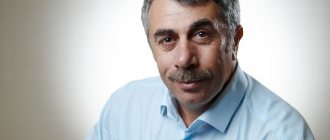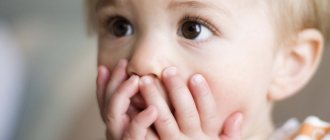: Reading time:
Learning to speak can be uninteresting, unprofitable, or even dangerous. Let's understand the psychological causes of speech development disorders together with psychologist Victoria Melikhova.
If a child does not say his first words between one and a half and three years, this is worth paying attention to. The pediatrician will tell you if you need to take the child to a neurologist and psychiatrist to rule out organic causes. I propose to consider the psychological reasons that prevent a child from developing speech and communication.
When is a child ready to speak?
For the first year, mother and child are in symbiosis. The baby cannot speak; his only language is crying. The mother develops an amazing ability to understand his “language” and translate it into universal human language: now the baby wants to drink, then he wants to eat, and in the evening he wants to sleep. Mom can satisfy his needs. Thanks to this, the child survives the first year.
Gradually, the baby stops latching, begins to crawl, and takes his first steps. This is a very significant event for him. Now he feels separate from his mother. He can move closer or further from her as much as he wants, he can run, he can reach the treasured shelf with a bright toy. It is at this age that the first words appear. As soon as the child begins to feel separate from the mother, the need to talk appears.
On the other hand, by the end of the first year, the mother gradually comes out of fusion with the child and loses her superpower to read minds. Now the child, in order to express himself and his needs, needs to learn to speak his mother’s language.
What to do if the child does not speak
Authors : Koval Irina
When parents come for a consultation with a speech therapist, they are often asked the question: the child is already 2 or 3 years old, but he does not speak or speaks very little - is this normal? Is there any reason to worry - maybe you just need to wait and everything will work itself out? Let's discuss this issue.
There are two groups of factors that cause delays in speech formation:
1) imperfection of social conditions of education and pedagogical errors, i.e. incorrect methods of upbringing in a family or child care institution, consisting in insufficient attention to the child on the part of adults or, conversely, in overprotection. The result is that the child does not develop the motivation for verbal communication: in the first case, he has no one to turn to, in the second, there is no need, he will be understood anyway, and everything will be done the way he wants, as quickly as possible;
2) insufficiency of the sensorimotor or neurological basis of the child’s speech. In this situation, not only changes in the conditions of education are required, but also the help of specialists - a neurologist, child psychologist, speech therapist, audiologist or teacher of the deaf. Correction of this form of speech pathology takes longer and requires more effort and attention.
In addition, if the parents of a child who has problems with speech development constantly ask him to “say”, “repeat”, then the picture of speech underdevelopment, as a rule, is aggravated by the presence of persistent speech negativism in the child, which can be expressed actively and passively, but in any case, the child refuses to speak not only on the orders of the parents, but also in any situation. Also, manifestations of speech underdevelopment are aggravated by the personal characteristics of the child, who is prone to stubbornness, self-will, and hysterical reactions.
Previously, it was believed that the main thing on which the development of speech depends is the degree of verbal communication between children and the adults around them: by listening to someone else’s speech, the child gets the opportunity to onomatopoeia, and in the process of onomatopoeia he learns to articulate syllables and words. Therefore, parents usually receive advice to talk more with their child. They redouble their efforts, trying to talk to the baby at every opportunity, but he continues to communicate with individual sounds and gestures.
What to do?
It is necessary to start working on the development of speech in a child as early as possible. The most effective period is considered to be the age from one and a half to 5 years, when speech function is actively developing.
It is important to draw the attention of parents to the fact that when communicating with a child, especially of early and early preschool age, one should not “fake” children’s speech, pronounce words distorted, or use truncated words or onomatopoeias instead of common words (“Where is the bibika?”; “Lala” wants to bye-bye?”), lisp. This will do nothing but harm to the child - “baby speech” will only inhibit the acquisition of sounds and delay the timely acquisition of vocabulary.
The child’s speech is also negatively affected by the frequent use by adults of words with diminutive or endearing suffixes, words that are inaccessible to the child’s understanding or that are complex in terms of sound and syllables.
If a child pronounces any sounds or words incorrectly, you should not imitate him, laugh, or, conversely, praise him. At the same time, it is impossible to demand the correct pronunciation of sounds at that period of the baby’s life when the process of formation of the speech apparatus is not yet completed.
Simultaneously with the development of speech, the child’s thinking, memory, and imagination develop, i.e. Speech develops and intelligence develops.
It is also necessary to remember the close connection between the functions of speech and hands. After all, finger movements and fine motor skills correlate with speech function. At the fingertips there are active points associated with the speech centers of the brain. First, subtle movements of the fingers develop, then articulation of syllables appears; all subsequent improvement of speech reactions is directly dependent on the degree of training of finger movements.
Therefore, it is necessary to start training your child’s fingers from an early age. The techniques can be very varied, but it is important that more fingers are involved in the movement and that these movements are sufficiently accurate and energetic.
Exercises to develop fine motor skills
Tear paper into small pieces (children do this with pleasure).
Sort or string large beads, fold wooden pyramids, inserts. The movements are carried out with two or three fingers.
In the future, the tasks become more complicated: fastening buttons, tying and untying knots, lacing.
It would be good to regularly massage your fingers and palms using special su-jok rings and a hedgehog ball.
Folk finger games provide very good training for finger movements (for example, “The White-sided Magpie,” “The Horned Goat is Coming,” “The Ghouls Have Arrived,” etc..). It’s better to start with the simplest ones, gradually complicating the tasks.
Speech development classes
Songs and nursery rhymes also work well. If you need to sing a nursery rhyme, don’t be shy! The baby will listen to the melody with interest and will soon try to reproduce it himself. At first he can stretch out one vowel, and later consonants, syllables, words and phrases will be added.
Read and tell children's stories and poems. Your reading should be so emotional and expressive that the child wants to listen to your intonation.
In the future, try to talk more with your child, voice (“verbalize”) all your actions, comment on what you see in the world around you, pronounce words clearly, distinctly, legibly and patiently.
If you have a feeling of anxiety about the slow formation of speech, seek advice from specialized specialists - a speech therapist, a child psychologist, a neurologist. Most likely, if specialists do not find any health problems, then speech therapists will recommend articulation gymnastics.
And finally, the most important advice: do not be annoyed or embarrassed that your child still does not speak. Your love and your patience will definitely help overcome this problem.
Good luck to you, loving and caring parents!
published 02/01/2019 09:00 updated 18/01/2019 — Pedagogy and psychology, Growth and development, Nervous, mental and psychological diseases, Speech development
Methods for diagnosing pathology
Diagnosis is approached in a comprehensive manner. This means that a small patient is examined by different specialists - a pediatrician, an otolaryngologist, a neurologist, a speech therapist. In addition to collecting an anamnesis, examining and assessing the child’s health, he is sent for hardware diagnostics. This is necessary because, against the background of ZPRD, organic matter changes, in particular, the work of the left hemisphere of the brain, which is responsible for the development of speech, is disrupted. Therefore, the final diagnosis is made based on the results of examinations - EEG, computed tomography, evoked potentials technique.
After diagnosis, comprehensive treatment begins. A neurologist, psychologist, speech therapist, and reflexologist take part in it. Parents play a huge role - without them it is impossible to achieve success.
First word
What should a baby's first word be? Early development specialists believe that it does not necessarily have to be familiar and familiar to us. Experts tend to consider any recognizable set of sounds that denote a person, object or action (for example, “baka” instead of “dog”, “ka” instead of “porridge”) as a peculiar word.
Usually children say their first word at the age of 8-9 months. Most often these are onomatopoeias or words of two repeated syllables.
How to understand that a child said exactly a word, and not just a set of sounds? If the child’s statements are repeated under the same circumstances, even if you cannot understand them, rest assured that your baby said a word, his speech apparatus is simply not yet developed enough to pronounce this word legibly. To prevent your child’s speech development from slowing down, you should not speak to your baby in his “baby” language. If your child says “beep beep” while pointing at a car, say, “That’s right, it’s a car.” While walking in the yard, ask your child to show you the car. And to translate the word “car” from a child’s passive vocabulary to an active one, point to the car and ask: “What is that?” Then your baby will certainly learn a new word and learn to pronounce it correctly.
There is a myth that a child’s first word must be the word “mother.” Indeed, some children say “mom” as early as 4-5 months. Also, even before one year old, children can say “Lala”, “Baba”, etc. These are all easy-to-pronounce words that are formed from the repeated babble of a child. The words that are easy to pronounce come first.
What is ZPRR
Delayed mental speech development of a child is a disease in which he lags behind age norms in his psycho-emotional development. Characterized by speech dysfunction, behavioral disorders, emotional disorders - rigidity or lability. Some children also experience motor dysfunction.
Develops against the background of diseases of the brain or central nervous system. On the one hand, a special neurological status can cause a delay in the development of the psyche and speech, on the other hand, the pathology itself negatively affects mental development.
About speech understanding
Speech understanding is one of the criteria for assessing a child’s speech, and no less important. The child may not speak, but can fully understand speech.
Speech comprehension should also be age-appropriate.
How to determine that a child understands speech?
The assessment of the speech understanding criterion occurs at 1 month of the child’s life.
- At 1 month, the baby flinches from a voice or sound.
- At 2 months, expresses anxiety about sounds or voices.
- At 3 months, looks at the speaker.
- At 4 months, he turns his head towards the speaker and stops crying when he is reassured by speech.
- At 5 months he begins to respond to his name, but this is only if he was previously addressed by name, and not just “baby”, “bunny” and so on, otherwise he will respond to the baby and the bunny.
- At 6 months he stops when he hears the word “no” and begins to use gestures. This does not mean that the child understands what you mean by “no.” Gestures are one way of speaking, for example, when a baby reaches out to be picked up.
- At 7 months, looks at a familiar object when it is named. Use question designs like: “Where is the bird?” Where's dad? We also teach the concept no: “Where is the bird?” - the child looks at the sky - “there is no bird.” And we show our heads no. At 7 months, the child realizes where he is; to do this, we bring him to the mirror, look at him and show him, calling him by name.
By the age of one year, a child’s vocabulary is 5-9 words, of course, it can be more. These words do not appear immediately at 12 months, but gradually. The first words can appear at 6-7 months, such as “whoa - cat”, “bang - fell”, “ss - chest” and the like. If all this is missing, it is too early to talk about delayed speech development, check your hearing and continue to develop and educate your baby.
There may be not a single word at all, and this will also be a variant of the norm, since the assessment is also determined by the understanding of speech.
It is not normal if per year:
- no babble
- does not point to the object
- does not use gestures.
You can't tell a child
- I don't understand you,
- what are you whispering there?
- speak louder and clearer!
The child should know that you always understand him, even without words.
If the child’s speech level does not correspond to the norm, most likely he was not taught and this is also a variant of the norm. It is possible to train.
Who needs examinations?
Examinations are needed if the doctor suspects a child has speech development delay (SDD). Not all children who do not speak have this delay and not all children need testing.
If RRR is still suspected, then the following examinations are necessary.
- Examination by a pediatrician.
- Examination by a neurologist.
- Examination by a psychiatrist (included in the medical examination of children 2 years old).
Research carried out according to indications.
- Electroencephalogram (EEG and sleep monitoring. In very rare cases, a child experiences developmental regression and this is associated with a large amount of epiactivity on the EEG during sleep, when the child does not have epileptic seizures.
- MRI.
- Genetic tests.
- Examination by an audiologist, audiometry,
- Acoustic Spectrum Disorder Test.
Forecasts and consequences: what to expect?
The effectiveness of treatment depends on many factors. The main ones are the age of the small patient, the severity of the delay in the child’s mental speech development and primary diseases.
Unfortunately, with deep-seated disorders or therapy started in 5-6 year old children, one cannot expect great results. Only in 0.2% of cases out of 100% is it possible that he will start talking. If a child has not mastered speech at the age of 7, he will never speak again.
If the parents turned for help when the baby was 2–3 years old, then there is every chance of a full recovery. In this case, everything depends on the degree of underdevelopment, the participation of parents and the methods used for treatment.
If parents expect that the child will speak on his own sooner or later, they are only wasting time. If this is not the individual pace of development of a particular baby, but really a problem, it will not go away on its own. Against the background of mental and speech underdevelopment, children suffer from poor memory and thinking, perceive and process information distortedly, and cannot concentrate attention. In the future, this leads to changes in personality - the child becomes irritable, closed, uncommunicative, and develops a feeling of inferiority.
conclusions
Speech development is a complex process, and it occurs differently for each child. Experts identify several stages of speech development in children, each of which involves the development of new speech skills. These stages do not have strict age limits. The transition from one stage of speech development to another can occur either smoothly or abruptly.
If the baby is healthy, speech development occurs naturally when you communicate with him and talk about the world around him. Your child watches you and tries to copy your speech, so it is important to monitor the correctness of your own speech. It is necessary to create a favorable environment for the child in which he can fulfill the needs characteristic of his age. You can offer your child games to develop fine motor skills, as well as introduce them to articulation and finger gymnastics.
If you feel that your baby is experiencing difficulties and the development of his speech is far behind the conventional boundaries of the norm, you need to consult with a specialist to rule out health problems and delayed psycho-speech development.
Causes of delayed mental speech development of a child
There are many factors that can trigger the disease. They can be divided into groups:
- Intrauterine development. Hypoxia, fetal infections. Its development after birth is influenced by illnesses and injuries that the mother suffered during pregnancy.
- Complicated childbirth. Traumatic, premature or rapid birth, entanglement.
- Diseases in the first year of life. Neuroinfections, brain injuries.
- Genetic factors. Chromosomal abnormalities and heredity - the disease tends to worsen in the next generation.
Delayed mental speech development of a child may occur against the background of diseases that disrupt the functioning of the brain. These include: congenital diseases of the central nervous system, epilepsy, hydrocephalus, cerebral palsy, brain tumors, disorders of the outflow of cerebrospinal fluid.
As a rule, parents learn about the situations listed above - congenital disorders, primary diseases and injuries - immediately and provide assistance to their child - they undergo treatment and rehabilitation courses.
But there are situations when a child is born physically and mentally healthy, grows and develops in accordance with age norms. And then suddenly he is diagnosed with SPD. Social factors can contribute to this : overprotection or, conversely, cruelty, violence or indifference towards the child, severe psychological trauma, unfavorable psychological climate in the family.
Reason 4. Bilingual family
Bilingual children “have the right” to begin to speak with some lag behind the norm. Hearing different languages spoken around them, they find themselves in a more difficult situation than their peers who only need to master one language.
In order to correctly construct speech, a child needs to separate one language from another. This requires some time. So it is quite possible that there is a delay in the onset of speech formation, the absence of common sentences, and errors in the grammatical construction of phrases.
Why doesn't he speak?
In fact, “does not speak” is a rather loose concept. Let's give examples.
- The child does not utter any words at all, not even “yes” and “no.” For a 1.5 year old this is normal, but for a 4 year old child this is already a problem.
- Doesn't speak sentences. For 2.5 years it will be the norm. At 4 years old you already need to worry.
- The child understands spoken speech, fulfills requests and instructions, regardless of complexity, but does not speak.
- The child talks a lot, but in “his” language.
- The child speaks, but those around him do not understand him, because he replaces many sounds.
That is, in each situation the concept of “does not speak” will be different. And here it is important to understand the reason, find an approach and correct it. In some cases, it is possible to involve more specialized specialists.
It is important to understand that in the process of speech formation, understanding it is more important than pronunciation.
Passive and active vocabulary
During this period, attention is drawn to such a characteristic feature as imitation of the words of adults. The baby repeats not only familiar words, but also previously unknown ones. These could be words addressed to the child, or words that he heard from others. Such active imitation can be noticed already from 1 year 5 months. Here it is important not to coo with children, faking your speech in “childish” language, but to give an example of the correct pronunciation of words.
Starting from the first year of life, the understanding of words grows; the baby is familiar with the names of objects in his immediate environment, the names of objects, animals and other objects that are most often shown to him in pictures in children's books, on the street. The baby loves to look at bright colored book illustrations. Adults should maintain this interest by choosing clear pictures.
When commenting on illustrations to a child, you need to speak precisely, in simple words, try to denote the object with one, constant word, so that the meaning of the picture is not lost in the stream of speech of an adult. For example, while the word monkey is used to describe monkeys and gorilla.
By the age of one and a half years, a child’s active vocabulary is 20–30 words; its sound composition is still simple. Thanks to the desire to imitate the speech of adults, by the end of the second year the baby increases the number of spoken words tenfold. Speech is dominated by nouns, but there are also verbs (2-3 times less of them) and adverbs (there, here, here).
Occasionally, by the age of two, the use of adjectives can be found in children's speech; this feature will continue to persist into early preschool age. Personal pronouns are often found in a child’s speech and are easily used (I, you, he, she).







